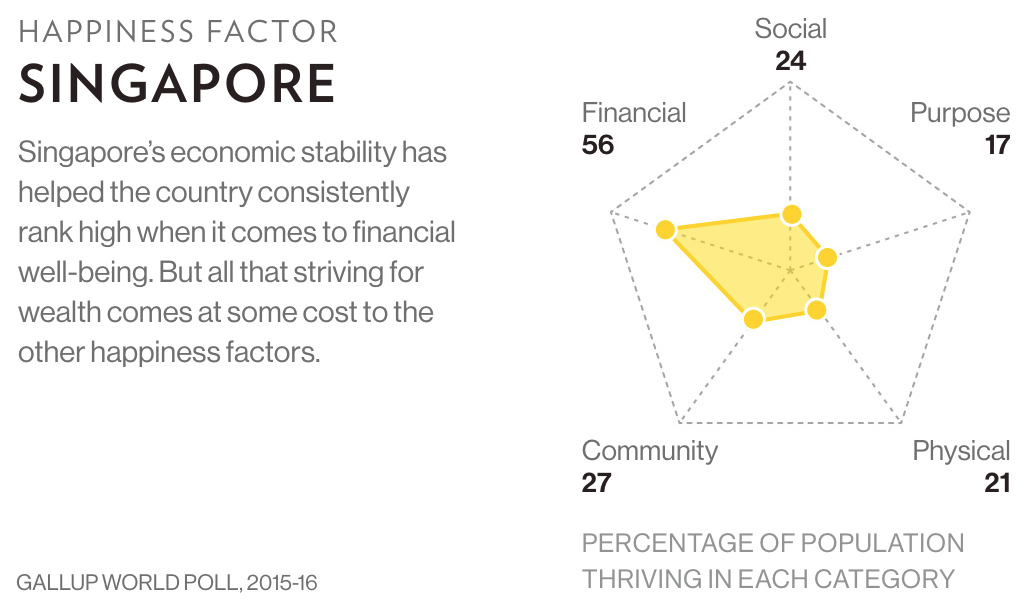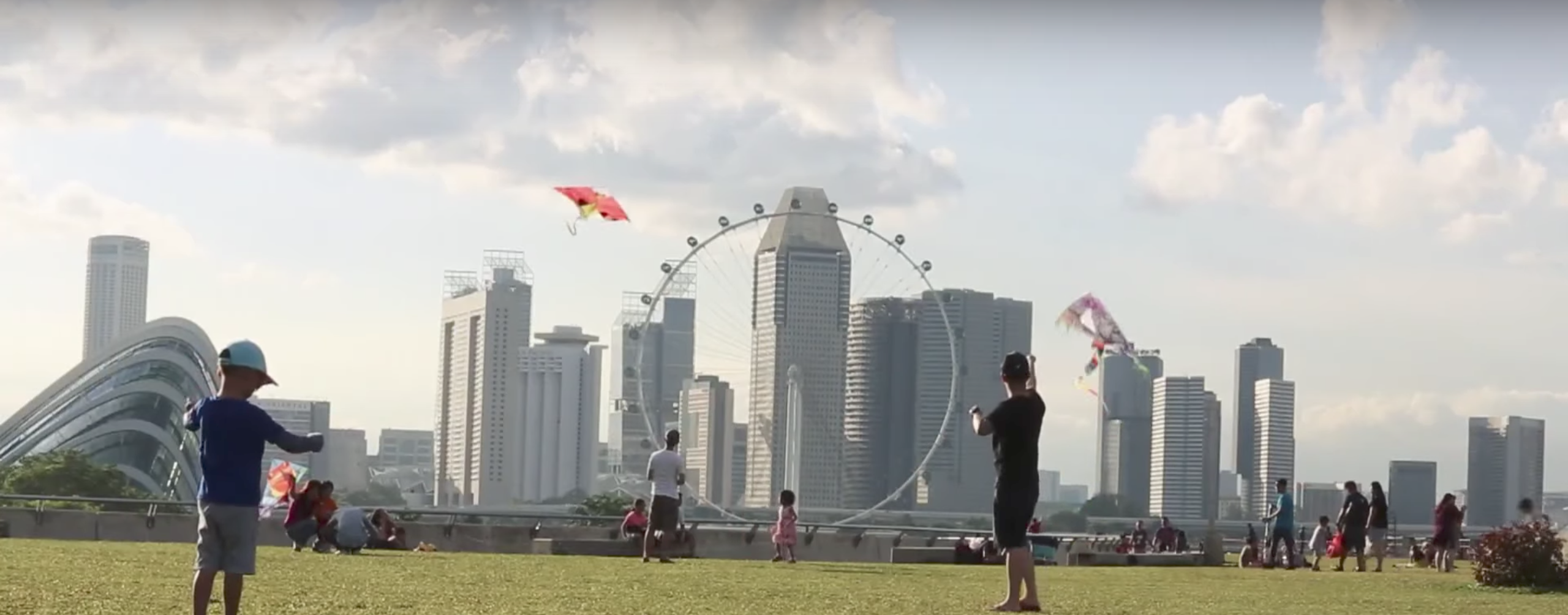Singapore is once again garnering fascination and envy from foreigners.
Nat Geo praise
In a National Geographic article on Oct. 18, 2017 by Dan Buettner, Singapore is exalted as one of the world's happiest places because it provided "a clear, safe path [which can lead] to success".
Titled These Are the World's Happiest Places, Buettner summarised the findings of his research from his new book, "The Blue Zones of Happiness: Lessons from the World's Happiest People", and claimed how three different systems in three different countries -- Denmark, Costa Rica, and Singapore -- are supposedly providing three different strands of happiness.
Buettner, who is a National Geographic Fellow and New York Times bestselling author, supported his happiness theory by citing three prime examples from each country.
Singapore's example is the transformational poor-boy-make-good story of one local multimillionaire.
He then used this as his reason to claim that Singapore represents the “life satisfaction” strand of happiness, as it apparently rewarded hard work.
Social scientists often measure this type of happiness by asking people to rate their lives on a scale of zero to 10. Experts also call this evaluative happiness. Internationally it’s considered the gold standard metric of well-being. Singapore has most dependably ranked number one in Asia for life satisfaction.
Singapore on the scales of happiness
According to Buettner, here are the reasons that gained us the title of one of the "world's happiest places":
1. We have economic stability
 Screenshot via National Geographic article
Screenshot via National Geographic article
"Singapore's economic stability has helped the country consistently rank high when it comes to financial well-being. But all that striving for wealth comes at some cost to the other happiness factors."
These other happiness factors that have been weighed out are the "social", "purpose", "physical", and "community" factors that can impact population thriving.
2. We have the fewest negative daily experiences
 Screenshot via National Geographic article
Screenshot via National Geographic article
"Singapore is one of five nations reporting the fewest negative daily experiences."
On the emotional scoring scale, Singapore has gone beyond the "Asian average" to have these nice days.
3. We uphold our values
Meritocratic values: "Success for Singaporeans lies at the end of a well-defined path: Follow the rules, get into the right school, land the right job, and happiness is yours. (It's traditionally summed up as the five C's: car, condominium, cash, credit card, and club membership.) In a system that aspires to be a meritocracy, talent and performance are rewarded, in theory. You'll hear Singaporeans complain about rising prices and their overworked lives, but almost all of them say they feel safe and trust one another."
Asian values: "With a keen appreciation for traditional Asian values, the late Lee Kuan Yew set out to build a society based on harmony, respect, and hard work. Anyone who made an effort to work, no matter how lowly the job, was guaranteed a livable wage. His 'workfare' program supplemented low salaries with housing and health care subsidies."
Values in ethnic diversity, religious freedom, equal education, and subsidised homeownership: "Although the population is largely composed of Chinese (74.3 percent), Malays (13.4 percent), and Indians (9.1 percent), Lee's government retained English as a lingua franca to help ensure no ethnicity would have the upper hand. He guaranteed religious freedom and equal education for all, and he subsidised homeownership. Most Singaporeans own a flat in government-developed housing, usually a high-rise unit. By law such buildings must reflect the ethnic diversity of the country -- so Singapore has no racial or ethnic ghettos."
Buettner claims that we have scored high because we're "living [our] values and are proud of what [we've] accomplished".
But although we "tend to be financially secure, have a high degree of status, and feel a sense of belonging", it may "take years" to achieve this type of happiness, and it "often comes at the expense of enjoying moment-to-moment daily pleasures".
4. We have the lowest stress and worry in our daily lives
In a similar video interview by NBC's Today, the bestselling author also claims we have the "lowest stress and worry in our daily lives".
However, he clarifies that "usually there's a trade-off between freedom and security", and in Singapore, "[we] have that security".
[related_story]
A happiness that appealed to hardworkers
In Buettner's research, one Douglas Foo was cited as a personification of Singapore's approach to happiness.
 SMFederation
SMFederation
A "hugely successful, community minded, consummately principled, and irrepressibly affable" multimillionaire, Foo, 48, is the Founder and Executive Chairman of local quick-service sushi chain, Sakae Sushi.
In other words, this was how Foo was described by the writer:
"A successful entrepreneur, he drives a USD$750,000 (SGD$1 million) BMW and lives in a USD$10 million (SGD$1.35 million) house. He's married, with four well-behaved children who excel at school. He put himself through school working four jobs and started a company that eventually grew into a USD$59 million (SGD$80 million) multinational enterprise. He works about 60 hours a week between his business and his philanthropic pursuits. He's earned the respect of his employees, peers, and the larger community."
But before we jump to conclusions, Buettner claims that it was not purely material wealth that Singaporeans accumulate that could foster our happiness, but rather, it was the system in which hard work can be rewarded that breeds it.
In fact, he thinks our system was one that drove hard work and promised happiness out of honouring our values rather than our desire for affluence.
In the video interview between Buettner and Foo, Foo supported the writer's happiness theory by explaining to him that he "worked hard largely for the benefit of his family", hence he is where he is now.
The businessman added:
"All of us [work hard largely for the benefit of our families]. Because you want to put food on the table for the family, make sure the kids go to a good school, and when that happens, you are happy."
To conclude this system that apparently rewards hard work and nurtures such happiness, Buettner calls Singapore "a place where people tend to look back in their lives and be very satisfied with it".
And sure enough, he saw it in Foo that "his clearest expression of happiness" were "neither his expensive sports car nor his trophy case of business awards", but instead, it was his "herculean work capacity" that had earned him "all the trappings of Singaporean success".
Happiness in Denmark and Costa Rica
Apart from Singapore's brand of happiness, two other types of happiness were explored, namely the ones from Denmark and Costa Rica.
For the Danes, happiness is derived from a system that "encourages the kind of balance between engaging work and rewarding play", as they have a government that "supports the well-being of people" while they "[set] aside time for self-fulfillment". Academics refer to this as eudaimonic happiness, a term that comes from the ancient Greek word for “happy.”
On the other hand, it was the sustaining of "day-to-day" "carefreeness" within a well-concocted "alchemy of geography and social policies" that has created "a powerful blend of family bonds, universal health care, faith, lasting peace, equality, and generosity" that gave Costa Ricans joy. Scientists call his type of happiness experienced happiness or positive affect.
If you're interested to understand more about Buettner's research, here's a video of an NBC's TODAY interview with him that includes Foo and his Costa Rican interview subject.
The example of Singapore starts at the 2 minutes 8 seconds mark:
&t=213s
For the example of Denmark, here's the full video:
Top image screenshot via NBC's TODAY's video
Here are some totally unrelated but equally interesting stories:
HDB things we are so used to now but will probably not miss in 10 years’ time
Which of these cool young Singaporeans would you want your kid to grow up to be?
If you like what you read, follow us on Facebook, Instagram, Twitter and Telegram to get the latest updates.

